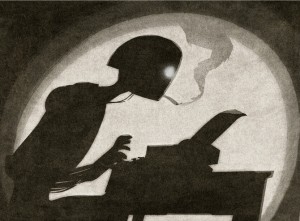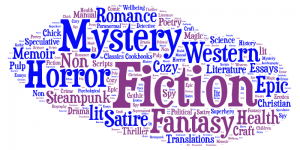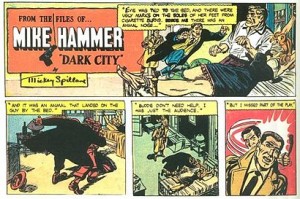The bots are coming, the bots are coming
 The times, they are a’changing, and faster than some of us might like. Us writers, for example. As Klaus F. Zimmerman has suggested:
The times, they are a’changing, and faster than some of us might like. Us writers, for example. As Klaus F. Zimmerman has suggested:
“If anyone needed a wake-up call about how much the world, as we know it, is changing, consider this: China betting its future on robots is certainly about the starkest signal imaginable.” (“The big trade-off in the world of labour,” The Straits Times, 1 May 2015)
And it isn’t just drivers and maids and things who face imminent unemployment (see “Don’t tease the Homebot” and links therein). Professional and even “artistic” types may soon have to adopt some brand-new bags.
“… Oxford University researchers forecast that, within 20 years, as many as half of all jobs could be affected. This includes quite a few job categories that are widely considered to require high skill levels.”
Writers don’t necessarily need the skill levels characteristic of aeronautical engineers, given that the consequences of writerly incompetence aren’t generally as dramatic, but they do have to know a few tricks, and it may surprise some to learn they’re under threat as well.
In fact, we may witness an ever-increasing deluge of new books at the same time the number of writers begins falling off to vanishing point. Read on.
Supersecretaries
The other day a Fitz’s Bar habitué whips out his smartphone and shows me a revolutionary tool for writers.
“This,” he tells me, “is a new and improved version of Mickey’s Spillane’s secretary.”
“Weren’t Mickey’s secretaries generally leggy and nice?”
“Yeah,” he says. “But.”
Mickey’s Muse
Spillane’s modus operandi, many of his admirers liked to believe, was to kick back with a bottle of whiskey, feet up on desk, and dictate his novels to a leggy secretary du jour. Who knows, these individuals might have even administered a few mid-stream stylistic adjustments to the flow of immortal prose. “Mickey’s Muse does better than that,” says my friend, discounting any associated lack of legginess. “It spins the whole yarn for you.” 
Choose from a typology of genres. (The New Yorker goes farther than you might expect in championing genre novels.) Select one of a few generic plots and two or three standard themes, specify your preferred era and setting, assemble a cast drawn from a grabbag of customizable prefab characters, and let ’er rip. A standard novel takes about 2.3 minutes in draft.
“Then you upload it to your computer. Make some revisions, fill in a few blanks. Change a name or two. Soften the female lead’s voice, maybe give her bigger boobs.”
“And?”
“And Bob’s your uncle. You’ve just authored another book. Feed it from your word processor or phone directly into Publishit.”*
And whoosh. Writers join the ranks of outmoded middlemen. With this latest technological breakthrough, writers go the way of literary agents and conventional publishers. What do you need with writers when you’re able to download and instruct Mickey’s Muse as easily as any writer can? All hail the digital millennium.
Disruption as progress
But who am I to oppose newness and improvedness, contemporary successors to older ideas of Progress?
“Even if you’re only a reader,” my friend tells me, “you can name the hero after yourself. Give yourself any personal attributes you like, maybe a facility with automatic weapons and a giant dick. Cast yourself as a famous writer with too many groupies to count. Hire yourself a nice leggy secretary. Hell, yeah.”
Never mind. More newness and improvedness lurks right around the corner. Given qubital computing together with fully immersive virtual realities, soon anyone who wants them will be able to enjoy the pleasures of life as a famous writer. Who wouldn’t skip the hard parts and go straight for the perks? In the meantime, you can outsource all the slog and sweat of story creation to Mickey’s Muse.
I’m sold.
“Madrid-based artist Alicia Martín’s amazing installation at Casa de America cultural center in the heart of Madrid appears to pour out of the building like an avalanche of literature. This piece is part of an ongoing series of installations around Spain titled Biografias or Biographies. Each one incorporates approximately 5,000 used books.”
“Too Many Books?” by Tim Parks. (Thanks to Kevin Cummings for birddogging this NYR article.)
Robot writers currently in action: here, and here, for just two examples. (I found the above robot writer graphic at these sites, but can’t find an artist to credit. Does anyone know who did it?)
Spillane vetting secretarial talent?
* Google has revealed the following anticipations of my ‘Publishit’ (above): Publish-It (poster software); PubliSHIT (a magazine); PublishIT (encryption stuff); and lots more. The Internet makes it harder and harder to think of things no one else has done already.



What could she do? Well as we can all see, sit up. close enough,hired.
http://www.poynter.org/news/mediawire/344335/resistance-is-futile-ap-to-use-computers-to-cover-baseball-games/
Four years on: “JPMorgan Chase found that Persado’s machine-learning tool crafted better ad copy than its own writers could muster, as measured by the higher click rates—more than double in some case.”
https://qz.com/work/1682579/jpmorgan-chase-chooses-ai-copywriter-persado-to-write-ads/amp/